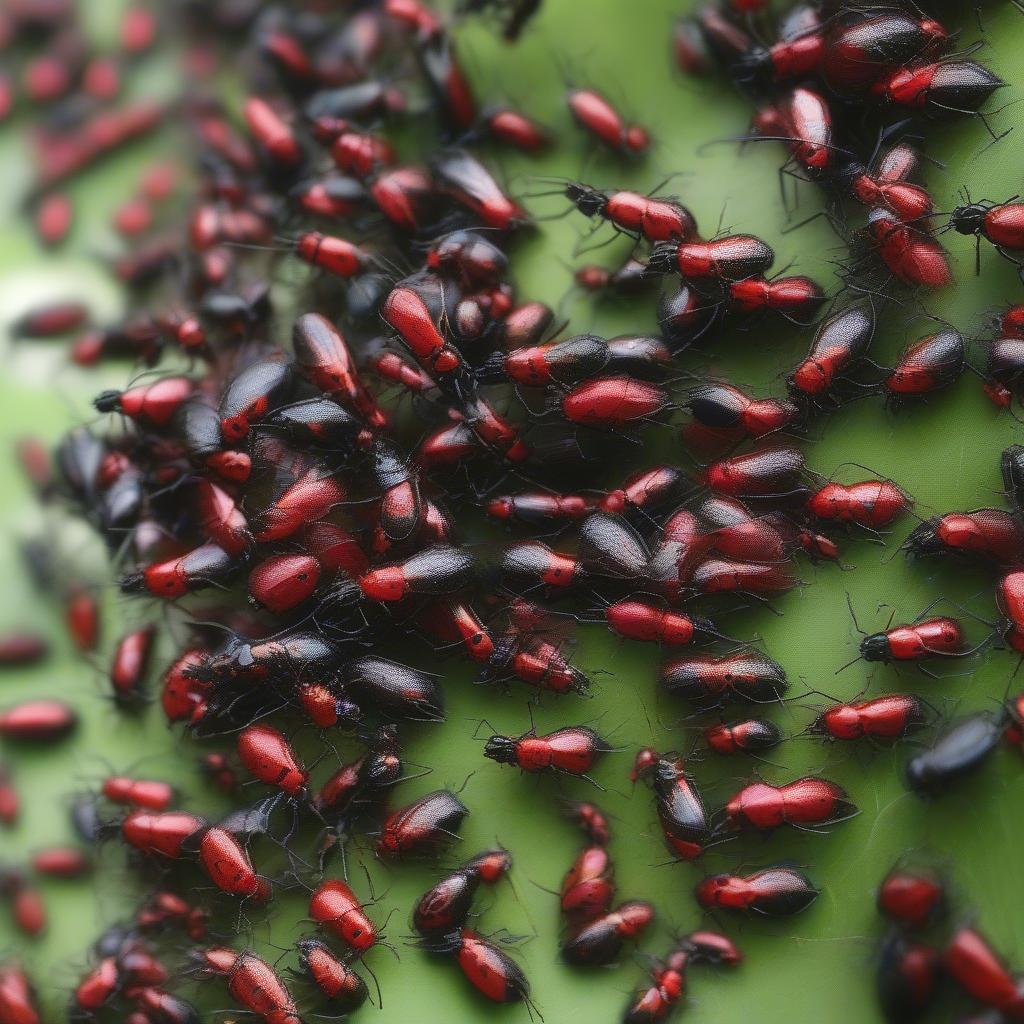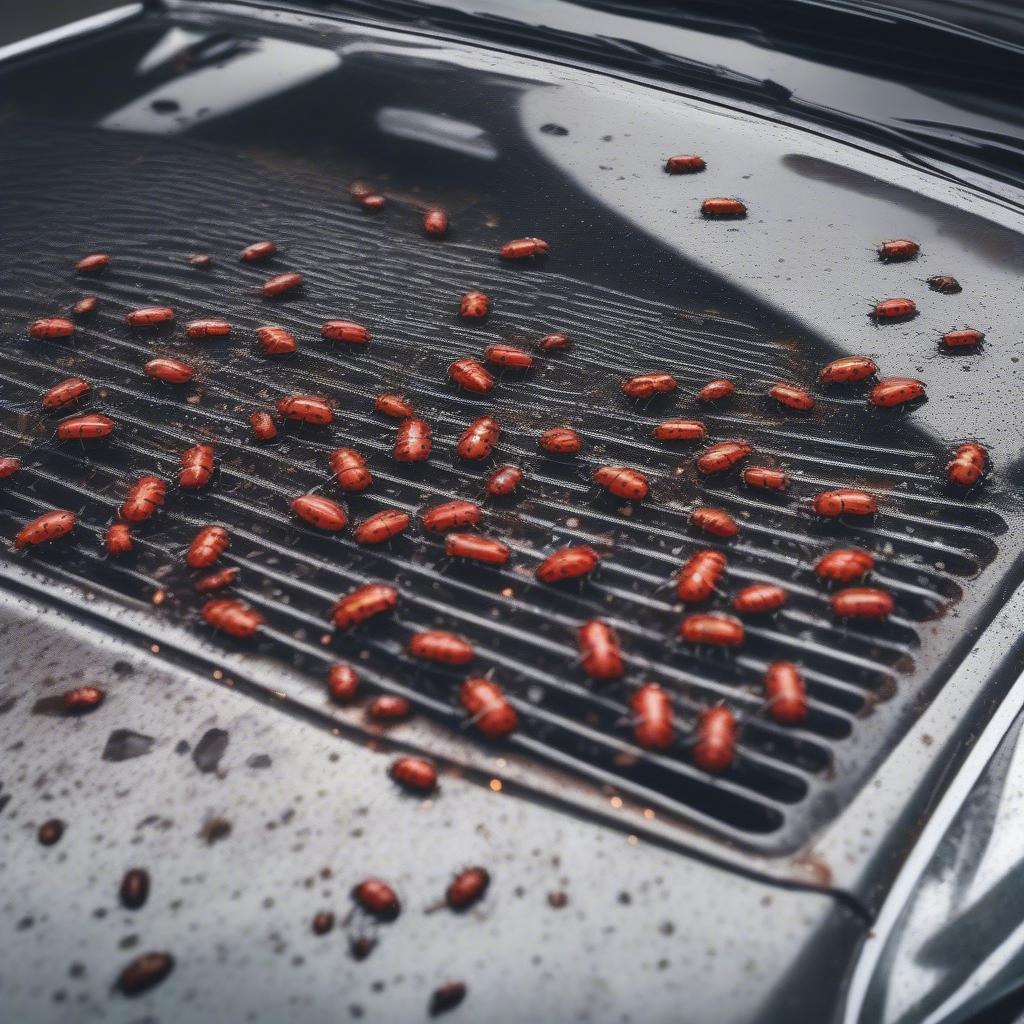Love bugs in Florida are a common sight, especially during mating seasons. These small, black flies with red thoraxes are not actually bugs, but rather a type of fly known as Plecia nearctica. While they don’t bite or sting, their sheer numbers and tendency to swarm can be a nuisance. They are particularly bothersome to drivers, as their acidic bodies can damage car paint if not removed promptly.
Love Bug Season in Florida: When and Where?
Love bugs typically emerge twice a year in Florida, in late spring (April-May) and late summer (August-September). Each emergence lasts for about four to five weeks.  Love bug swarm in Florida during mating season These swarms are most prevalent during daylight hours, especially on warm, sunny days. You’ll find them near highways, roadways, and areas with lush vegetation. While their presence can be frustrating, it’s important to remember they play a role in the ecosystem by breaking down organic matter.
Love bug swarm in Florida during mating season These swarms are most prevalent during daylight hours, especially on warm, sunny days. You’ll find them near highways, roadways, and areas with lush vegetation. While their presence can be frustrating, it’s important to remember they play a role in the ecosystem by breaking down organic matter.
Why Are Love Bugs Called Love Bugs?
The name “love bug” stems from their constant mating behavior. You’ll often see them flying connected in pairs, even while in flight. This coupled flight is part of their mating ritual, which can last for several days.
Are Love Bugs Harmful?
Love bugs are not harmful to humans. They don’t bite, sting, or transmit diseases.  Love bugs splattered on a car in Florida However, they can be a significant nuisance, especially for motorists. Their acidic body fluids can damage car paint if left to dry and bake in the sun.
Love bugs splattered on a car in Florida However, they can be a significant nuisance, especially for motorists. Their acidic body fluids can damage car paint if left to dry and bake in the sun.
How to Deal with Love Bugs in Florida
Dealing with love bugs can be challenging during peak season. Here are some tips to minimize their impact:
- Drive during cooler times of day: Love bugs are less active during the early morning and evening hours.
- Use a bug screen or deflector on your car: This can help reduce the number of love bugs that hit your vehicle.
- Wash your car frequently: Remove dead love bugs as soon as possible to prevent damage to your car’s paint. A mixture of baking soda and water can help loosen dried bugs.
- Apply a protective coating of wax to your car: This can provide an extra layer of protection against the acidic residue.
Do Love Bugs Serve a Purpose?
While often considered a pest, love bugs play a role in the ecosystem. Their larvae feed on decaying organic matter, contributing to nutrient cycling. They also serve as a food source for other insects and animals. Dr. Emily Carter, an entomologist specializing in Florida insects, explains, “Love bugs, despite their nuisance factor, are an important part of the natural decomposition process, helping to break down organic materials and return nutrients to the soil.”
Conclusion
Love bugs in Florida are a seasonal phenomenon that, while annoying, are not harmful. Understanding their life cycle and taking preventative measures can help minimize their impact. By following the tips outlined above, you can navigate love bug season with less frustration.
FAQ
- When is love bug season in Florida? Love bug season typically occurs twice a year: April-May and August-September.
- What do love bugs eat? Adult love bugs feed on nectar, while their larvae feed on decaying plant matter.
- Do love bugs bite? No, love bugs do not bite or sting humans.
- Why are they called love bugs? They are called love bugs due to their persistent mating behavior.
- How can I protect my car from love bugs? Wash your car frequently, use a bug screen, and apply a protective wax coating.
- Are love bugs harmful to the environment? No, they actually play a beneficial role in breaking down organic matter.
- Where do love bugs lay their eggs? They lay their eggs in decaying vegetation.
For further assistance, please contact us at Email: contact@daiduongtranhba.com, address: Michigan Ave, Suite 3100, Chicago, IL 60611, USA. We have a 24/7 customer service team.

